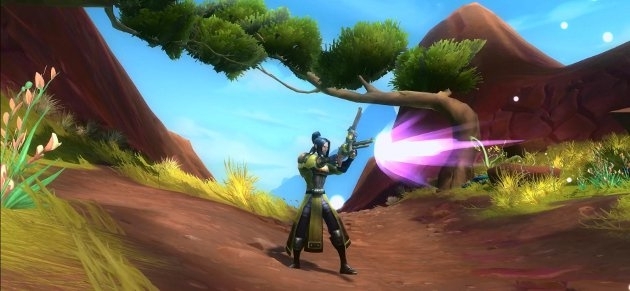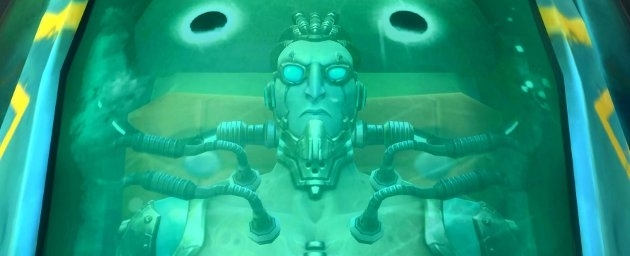WildStar: Business Model Revealed
ZAM talks with Jeremy Gaffney on the payment options for WildStar

Today, Carbine and NCsoft lift the veil on the business model for the much-anticipated sci-fi MMO, WildStar.
On Friday, I was one of a limited number of journalists to take part in a conference call with executive producer, Jeremy Gaffney. A hybrid business model has been hinted at previously, but I have to say I was somewhat surprised by what was announced.

In somewhat related news, along with the business model Carbine confirmed the current target for WildStar’s release window. To get that tidbit out of the way: the new aim for WildStar’s release is Spring 2014, with Gaffney stating that is very reliant on the feedback provided in the betas leading up to launch.
Jeremy Gaffney: “It’s very dependent on our players though. We reserve the right to flip-flop around, because we have to have people in the beta going ‘Yeah!’ and we have to have all of our content in and tested in the beta, but right now we’re targeting early 2014, spring 2014.”
Though fans might be disappointed that another game will not be seen this year, it’s good that Carbine and NCsoft want a quality MMO first rather than any MMO fast.
So how will you pay for the game sometime in early 2014?
First, you will have to pay for the game at the outset. Both the physical and digital copies will be the same price. There was no mention of a collector’s edition in the conference call so over the weekend I reached out to Carbine’s Michael Shelling, who stated that, though there are discussions about a CE, there is nothing concrete at the moment.
The standard box will cost $59.99—or €44.99 and £34.99 for gamers across the pond—and will include 30 days of playtime and three guest play passes, each worth one week to discover the charms of Nexus.
Having three guest passes at the outset is a very smart move. As Gaffney noted, the importance of having friends to develop retention in an MMO is very important and the guest passes might help persuade groups of friends to make the jump from their regular MMO to WildStar.
“We want you playing with your buddies immediately. We want you to come in because I think a lot of people stay in games for a long, long time because their buddies are playing them. I think [some of] the keys to long-term play are letting social behavior emerge and incenting it wherever you can.”
You will need a payment method—credit card or Game Time Card—added to your account upon purchase in order to claim your first free 30 days. This, for those paying attention, means there is a subscription option for WildStar. The subscription price depends on the period of commitment you undertake:
|
Subscription
|
Cost Per Month $ |
Cost Per Month € |
Cost Per Month £ |
|
1 Month |
14.99 |
12.99 |
8.99 |
|
3 Months |
13.99 |
11.99 |
8.49 |
|
6 Months |
12.99 |
10.99 |
7.99 |
|
12 Months [BEST DEAL] |
10.99 |
9.99 |
6.99 |
Subscription Total Costs
|
Subscription
|
Total Cost $ |
Total Cost € |
Total Cost £ |
|
1 Month |
14.99 |
12.99 |
8.99 |
|
3 Months |
41.97 |
35.97 |
25.47 |
|
6 Months |
77.94 |
65.94 |
47.94 |
|
12 Months [BEST DEAL] |
131.88 |
119.88 |
83.88 |
Game Time Cards with durations of 15, 30 and 60 days will be available online or from major retail outlets.

With the hints of a hybrid revenue model in recent months, a subscription option was certainly expected as one of the ways to pay for WildStar. Gaffney explained that the other option for players centers on playing-to-pay.
C.R.E.D.D.
C.R.E.D.D.—Certificate of Research, Exploration, Destruction and Development— is the currency in WildStar that isn’t in-game gold. It’s available for purchase either through the Commodities Exchange—known as CX—with gold earned by players as they adventure, craft and generally run about, or by paying real money via the WildStar home page.
I asked whether the Commodities Exchange would be a universal system with its price generated by trades across all servers. Shelling said that though some aspects of the CX are cross server, the universality of the system has not been decided yet, with the team waiting for feedback from testers before determining the final features of the system.
Like PLEX in EVE Online, C.R.E.D.D. can grant 30 days of subscription from within WildStar, by using the item in your inventory like a potion that extends your account’s sub time.
C.R.E.D.D.’s value will fluctuate like on any currency market within WildStar itself, based on the player trading on the CX. I immediately wondered what systems would be in place to prevent market manipulation of C.R.E.D.D. When asked about the issue Gaffney said that it will be fascinating to see how players attempt to engage with the Commodities Exchange, including those who will actively look to manipulate C.R.E.D.D. values.
In a move that I know caused me to raise my eyebrows initially, purchasing C.R.E.D.D. on the WildStar website will cost more than a month’s subscription. The price, across North American and European regions will be $19.99, €16.99 and £11.99.




